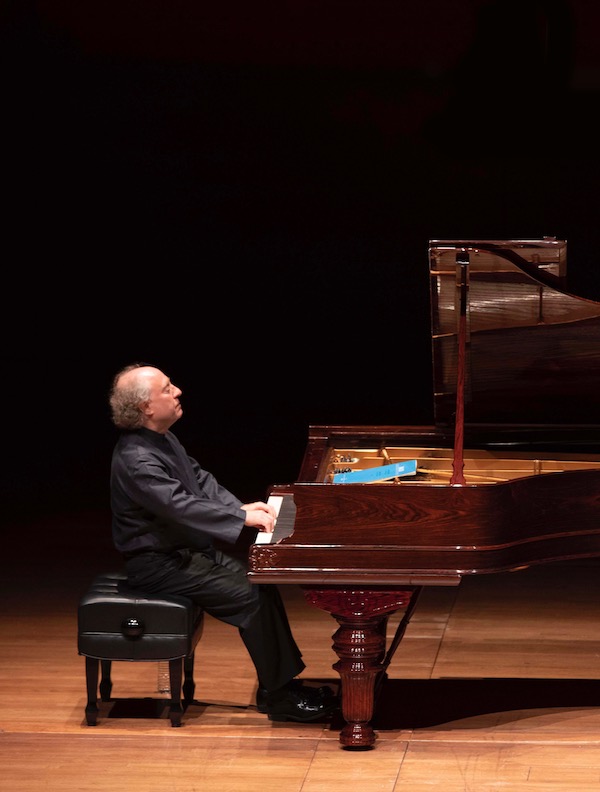Despite stumbles Kahane’s quirky “Goldbergs” pays ample rewards

There’s a story to be written about how Bach’s music came to be associated with the Advent season. In New York, performances of the Goldberg Variations and the Brandenburg Concertos are a December staple, while WKCR has been broadcasting their Bach Festival—eight straight days of the master’s music, from Christmas Eve to New Year’s Eve—for 40 years.
This Bach season unofficially opened Tuesday night in Alice Tully Hall with the first concert of what the Chamber Music Society of Lincoln Center is calling their Baroque Festival—pianist Jeffrey Kahane playing the Goldbergs. More than just a concert, this was a hybrid evening that began with a lecture and featured a piano with some historical significance.
Kahane himself delivered the lecture, assisted by the Calidore String Quartet, there to play the different contrapuntal lines of some of Bach’s canons. This was also something of a hybrid, with the pianist first introducing the topic of Bach’s interest in numerology and through that a connection to the religious significance of numbers found in Dante’s Inferno. This was intriguing but too brief, suggesting things that deserved deeper exploration before one could be fully convinced.
Kahane and the Calidore played the bass line that is the subject for the variations, then played a handful of Bach’s “puzzle” canons found at the back of an original score of the Goldbergs that turned up in the mid-1970s. There was some intellectual delight in hearing music one had previously only read about.
The second half was all Kahane and all Goldbergs, with the piano as featured supporting player. This was a Steinway D built in 1884 and restored just last month. There was an entire essay devoted to the instrument in the program materials, which also included a packet with some facsimile reproductions of the original, hand-written score, and most of the puzzle canons in modern engraving.
This piano had a spectacular sound; rounded, resonant, bright but with the warmth of the sun. There was a unique glow to its treble register. It is an altogether beautiful instrument that, in Kahane’s mercurial and spontaneous performance, at times became too much of a good thing.
Kahane’s tempo for the Aria was quick, and he stayed on the fast side of things for most of the variations. This wasn’t speed for speed’s sake; he was pushing at the edge of the music.
In the opening and closing Arias, he played around with the grace notes and trills, taking a new approach with each one. The directed freedom was invigorating, and though the pace of most of the variations did not allow space for such touches, it conveyed the feeling that Kahane was trying something new in the moment.
At times this was literal, but also inadvertent. The pianist’s flow and articulation were mostly dazzling, with tremendous bounce in his left hand in Variation 3, his mind as quick as the rhythms in Variation 7. But there were times when his hands ran over themselves and compressed sequences of notes, like in Variation 5. In Variation 8, he was near the point of losing control, but started trying out different articulations on the fly, got things back in hand, and righted himself with the repose of Variation 9. This was distracting and at times messy.
In the main it was welcome to hear a musician take chances with a well-known work, and be willing to make mistakes in the service of saying something and getting somewhere.
But the fire and inspiration in his playing at times turned the piano into a bludgeon. There is such a thing as too much beauty, and just as one shouldn’t stare at the sun, so the sheer sound of this instrument built to an overwhelming monotone.
Slower variations, like 15, came just in time to open up contrasting sensations, Kahane was simple and sincere in these, involved and at something of a peak in Variation 20. After an emphatic, even intense, Quodlibet that demolished all doubts and cemented the thrill of his performance, the Aria returned. It was far slower than the first time, plainer, a peaceful and fulfilling conclusion to a personal and fascinating journey.
The Chamber Music Society of Lincoln Center plays Corelli’s “Christmas Concerto” and music by Bach, Tartini, Vivaldi, and others, 7:30 p.m., December 10. chambermusicsociety.org


